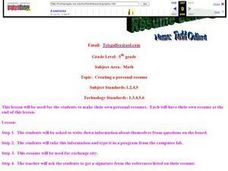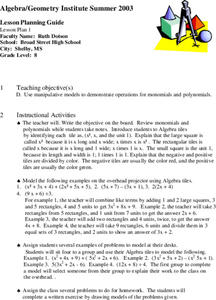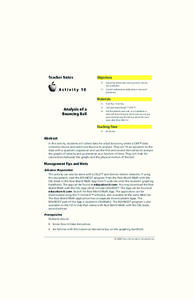Curated OER
TE Lesson: Land on the Run
Students study the causes of different types and speeds of landslides. They determine that landslides are the result of gravity, friction, and the materials involved. They examine the step engineers are taking to prevent and avoid...
Curated OER
Kids Collect LEGOs for New Orleans
Students read and discuss a news article about children that collected 1.5 million LEGO bricks for kids in New Orleans after Hurricane Katrina. They complete a fill-in-the blank activity, answer article comprehension questions, solve...
Curated OER
Similar triangles
Tenth graders investigate the theorems of ASA, AAS, AAA and ASA. For this geometry lesson, 10th graders discuss the theorems of triangles and how it is used to solve for missing sides or angles. They review how two angles are formed by...
Curated OER
You Sank My Battleship
Learners apply the concept of transformation to the game of battleship. In this algebra lesson, students relate their linear equations to how they would graph or set up their game pieces to win.
Curated OER
Creating a Personal Resume
Fifth graders be asked to write down information about themselves from questions on the board. They take this information and type it in a program from the computer lab. The resume will be kept in their expandable file for future reference.
Curated OER
Pedal Triangles
Students identify the properties and theorems of triangles. In this geometry lesson, students construct angle bisectors using a compass and straight edge. They identify triangular similarity and congruency.
Curated OER
Menelaus' Theorem
Students investigate Menelaus Theorem. In this geometry lesson, students calculate the area of polygons. They differentiate between boundaries point, interior points and area of lattice points.
Curated OER
Ceva’s Theorem
Students prove and use Ceva's Theorem to solve problems. In this geometry lesson, students analyze polygons for patterns and calculate the area of each shape. They relate polygons to the real world.
Curated OER
Finite Geometry
Students solve for the area and perimeter of polygons. In this geometry instructional activity, students identify repeated patterns and create formula to solve problems. They make conjectures and prove hypotheses.
Curated OER
Polynomials
Eighth graders investigate the concepts and combining them into polynomials. The teacher uses direct instruction for delivery. They can use Algebra to make this lesson hands-on for the benefit of kinesthetic learners.
Curated OER
Sort it Out
Students identify and sort a variety of two- and three-dimensional objects and compare and contrast their attributes. They identify shapes, locate shapes on the faces of solids, sort real objects and explain the sorting rule, and...
Curated OER
Comparing and Ordering Fractions
Students practice ordering fractions. In this fractions activity, students determine how to tell when a fraction is close to 1, 1/2 and other various fractions. Students use benchmarks to order fractions.
Curated OER
Mathematicians of the Month
Seventh graders become familiar with the history and times which influenced a featured mathematician each month. Through Internet research, they gather information about a different mathematician each month. Students solve mathematical...
Nuffield Foundation
Investigating Factors Affecting the Breathing Rate of a Locust
Do animals breathe faster when given more oxygen or more carbon dioxide? Young scientists observe the respiration rates of locusts under a variety of gas concentrations to answer that very question. They collect data, analyze the...
California Department of Education
Possible Careers
Is a STEM career the right choice for me? Lesson four in a six-part career and college readiness series introduces seventh graders to the world of STEM occupations. Individuals use their Holland code results to select, research, and...
Serendip
Understanding and Predicting Changes in Population Size – Exponential and Logistic Population Growth Models vs. Complex Reality
Salmonella poisoning impacts over 200,000 people in the United States each year. Scholars learn about the growth of these bacteria using multiple approaches. Then they apply the same growth calculations to endangered species and think...
Teach Engineering
Designing a Spectroscopy Mission
In this mind-bending activity, young engineers explore this question of whether or not light actually bends. Using holographic diffraction gratings, groups design and build a spectrograph. The groups then move on research a problem...
Polar Trec
Ozone Data Comparison over the South Pole
Did you know the hole in the ozone is seasonal and filled by January every year? The lesson uses scientific measurements of the ozone over the South Pole to understand patterns. Scholars learn that the hole grew bigger annually before...
Mascil Project
Packaging
Wrap up an engineering lesson with a worthwhile project. An engineering design task challenges groups to develop a package for a pharmaceutical company given constraints on the volume. Learners then create a presentation to highlight...
Workforce Solutions
Reality Check
Scholars complete the Reality Chech handout that identifies their potential salary given a specific profession. Pupils examine the lifestyle options and choose what they wish to have; however, each item costs money and, depending on how...
Curated OER
Robot Ramps
Students write the slope of a linear equation. In this algebra lesson, students follow a robot along a coordinate plane and create an equation to represent the ramp created. They identify the points the ramp passes through.
Curated OER
Plate Tectonics: An "Eggs"periment
Young scholars investigate plate tectonics by observing a cracked egg shell. In this Earth science lesson, students draw borders of continents on an egg shell, only to watch it crack in a glass. Young scholars record the breakup of the...
Curated OER
99.86% - Measuring Our Sun's Mass
Students determine just how large the sun is. In this solar system lesson, students follow the prescribed steps to draw a box that represents the size of the sun and its mass compared to the entire solar system.
Curated OER
Bouncing Ball Experiment
Students collect data for a bouncing ball and select one bounce to analyze. They explore the relationship between velocity, position and acceleration. They seek out connections between the graphs and the physical motion of the ball.

























